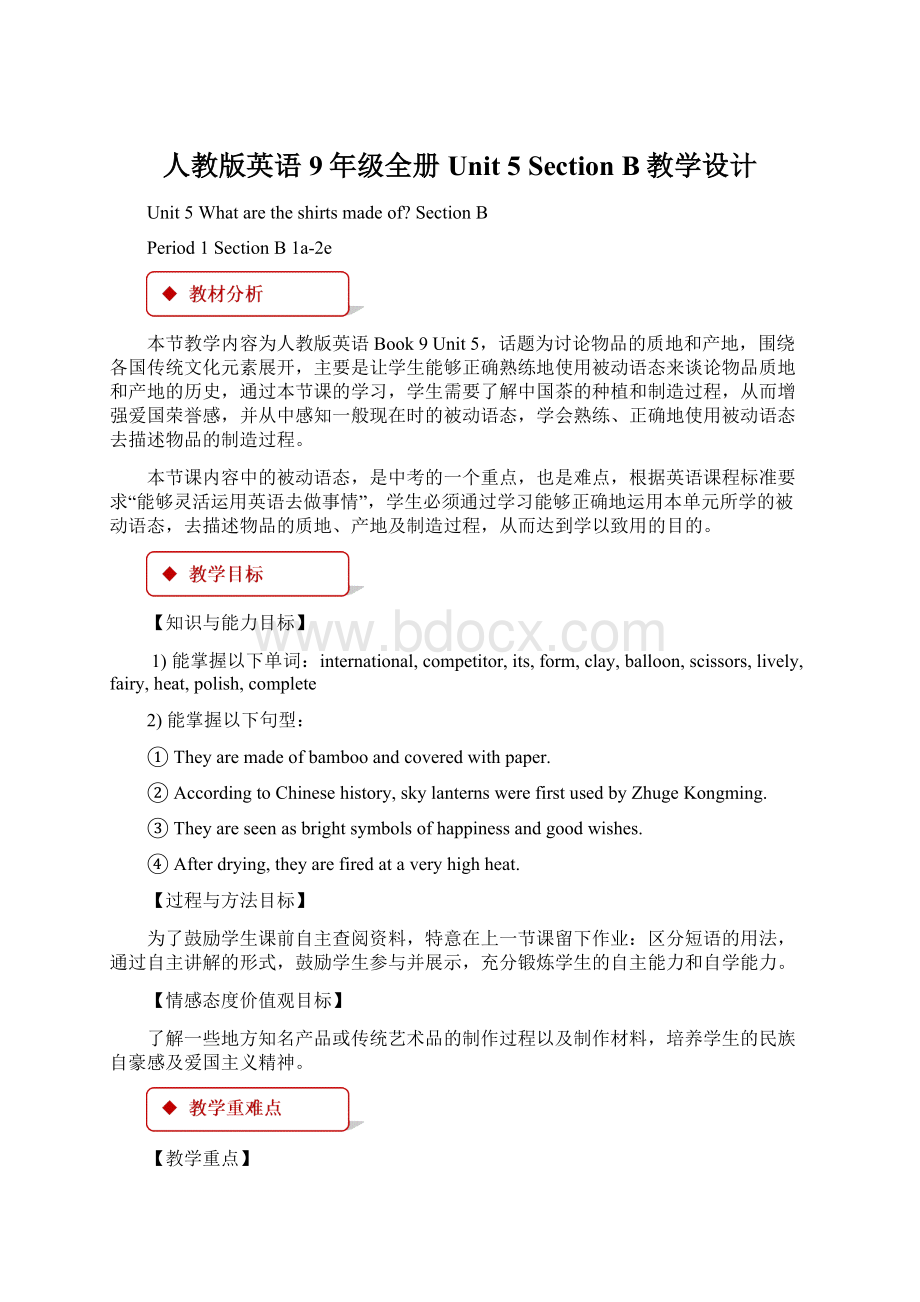人教版英语9年级全册Unit 5 Section B教学设计.docx
《人教版英语9年级全册Unit 5 Section B教学设计.docx》由会员分享,可在线阅读,更多相关《人教版英语9年级全册Unit 5 Section B教学设计.docx(11页珍藏版)》请在冰豆网上搜索。

人教版英语9年级全册Unit5SectionB教学设计
Unit5Whataretheshirtsmadeof?
SectionB
Period1SectionB1a-2e
本节教学内容为人教版英语Book9Unit5,话题为讨论物品的质地和产地,围绕各国传统文化元素展开,主要是让学生能够正确熟练地使用被动语态来谈论物品质地和产地的历史,通过本节课的学习,学生需要了解中国茶的种植和制造过程,从而增强爱国荣誉感,并从中感知一般现在时的被动语态,学会熟练、正确地使用被动语态去描述物品的制造过程。
本节课内容中的被动语态,是中考的一个重点,也是难点,根据英语课程标准要求“能够灵活运用英语去做事情”,学生必须通过学习能够正确地运用本单元所学的被动语态,去描述物品的质地、产地及制造过程,从而达到学以致用的目的。
【知识与能力目标】
1)能掌握以下单词:
international,competitor,its,form,clay,balloon,scissors,lively,fairy,heat,polish,complete
2)能掌握以下句型:
①Theyaremadeofbambooandcoveredwithpaper.
②AccordingtoChinesehistory,skylanternswerefirstusedbyZhugeKongming.
③Theyareseenasbrightsymbolsofhappinessandgoodwishes.
④Afterdrying,theyarefiredataveryhighheat.
【过程与方法目标】
为了鼓励学生课前自主查阅资料,特意在上一节课留下作业:
区分短语的用法,通过自主讲解的形式,鼓励学生参与并展示,充分锻炼学生的自主能力和自学能力。
【情感态度价值观目标】
了解一些地方知名产品或传统艺术品的制作过程以及制作材料,培养学生的民族自豪感及爱国主义精神。
【教学重点】
1)掌握本课时出现的生词及用法。
2)进行听力训练,提高综合听说能力。
3)阅读短文,获得相关信息,提高学生们的综合阅读能力。
【教学难点】
1)听力训练
2)阅读2b部分的短文并完成相关要求。
1.准备录音机和磁带;
2.设计课后巩固练习;
3.ppt;
Step1.Revision
1.Dailygreeting.
2.Review.主动语态变被动语态的方法
Computersareusedtosearchinformation.
Thestoryisoftenrepeatedbytheteacher.
ThecatsarecarefullylookedafterbyBill.
Englishisn’toftenspokenbyusathome.
Step2.Presentation
1.Presentthenewwordsonthebigscreenandlearnthenewwordstogether.
clayn.黏土;陶土balloonn.气球
scissorsn.剪刀fairytale童话故事
papercutting剪纸celebrationn.庆典;庆祝活动
internationaladj.国际的
e.g.Thekilogramistheinternationalstandardofweight.
公斤是国际通用的重量标准。
competitorn.参赛者;竞争者
compete(动词)+or→competitor(名词)
e.g.Wecancompetewiththebestteams.
我们能与最好的队竞争。
Eachcompetitorshouldwearanumber.
每个比赛者必须佩戴一个号码。
formn.形式;类型
e.g.Joggingisahealthyformofexercise.
慢跑是一种健康的锻炼方式。
itsadj.它的
e.g.Mypetdoglikescatchingbiscuitsinitsmouth.
我的宠物狗喜欢用嘴接饼干。
livelyv.生气勃勃的;鲜艳的
e.g.Maryisalovelyyoungwomanwithimagination.
玛丽是一名富有想象力生气勃勃的年轻女人。
historicaladj.(有关)历史的
e.g.Thesearenotjusthistoricalpoints.
这可不仅仅是历史的观点。
heatn.热;高温v.加热;变热
e.g.Heatthewater,otherwiseitwillfreeze.(动词)
把水加热,否则会结冰。
Theheatfromthefirewillsoondryyourcoat.(名词)
炉火的高温很快就会烘干你的上衣。
polishv.磨光;修改;润色
e.g.Let’spolishthesilverbeforetheguestsarrive.
让我们在客人到达前将银器擦亮。
Wouldyoupolishupthearticleabit?
你把文章再润色一下好吗?
completev.完成
completesth.完成某事
completedoingsth.完成做某事
e.g.Theymadeeveryefforttocompletethetask.
他们尽最大努力完成任务。
Theyhavejustcompletedbuildingthebridge.
他们刚刚建成那座大桥。
2.Ssreadandtrytorememberthenewwords.
Step3.Leadin
PresentthepictureandletSstalkabout:
DoyouknowsomethingaboutWeiFangInternationalKiteFestival.
Doyoulikeflyingkites?
Whatkindofkitesdoyouhave?
Step4.Listening
Workon1a
1.Doyouknowhowtoflyakite?
Whatarekitesmadeof?
Writedownsomematerialsusedinmakingkites.
2.LetSsdiscussaboutit.Thenwritedowntheiranswers.
3.Checktheanswerstogether.
bamboo,steel,paper,clothes,cord,knife,scissorsandsoon.
Workon1b:
1.TellSstolistentoaconversationbetweenLauraandZhengYunandcirclethecorrectanswers.
2.PlaytherecordingfortheSs.Ssjustlistenforthefirsttime.Playtherecordingagainandcirclethecorrectanswers.
3.Checktheanswers:
Workon1c:
1.LetSsreadthesentencesin1cfirst.TellSstolistenagainandwriteLforLauraorZforZhengYun.
2.PlaytherecordingagainfortheSstolistenandwritethewords.
3.Sslistentotherecordingcarefullyandtrytowritedowntheiranswers.
4.Checktheanswerswiththeclass.
Workon1d
1.Listenagainandfillintheblankswithwhatyouhear.
2.Sslistenandtrytowritedowntheiranswers.
3.ChecktheanswerswiththeSs.
Step5.Role-play
1.Workinpairs.Role-playaconversationbetweenLauraandZhengYunusingtheinformationin1b-1d.
2.LettwoSsmakeaconversationasamodel:
A:
Wheredidyougoonvacation?
B:
Iwenttoaninternationalkitefestival.
A:
Thatsoundsinteresting.Whatdidyouseethere?
B:
Isawmanydifferentkindsofkitesatthefestival.
A:
Werethekitesnice?
B:
Yes,theywerebeautiful.Theyweremadeofdifferentthingslikesilkorpaper.Somewerepaintedwithcolorfuldrawings.
A:
Soundslikeyoureallyenjoyedit.Ineverthoughtthatsomethingassimpleaskiteflyingcouldbesoexciting.
B:
Yes,itwasreallyfuntoseewhichkitecouldflythehighest.
A:
IthinkIwanttolearntoflyakite,too.
Step6.Production
1.Showsomepicturesofthepapercuttingonthebigscreen.TellSstheyareChinesepapercuttings.It’soneoftheChinesetraditionalarts.
T:
Doyouknowfolkortraditionalarts?
Nowdiscusswithyourpartner.
2.AsksomeSssaywhattheyknowaboutthefolkortraditionalarts.
Step7.Reading
TellSsthefollowingisaboutthreekindsofChinesetraditionalarts.
FastReading:
1.Readthepassageandcompletethechartbelow.
Traditionalartform
Materialsused
2.Checktheanswers.
CarefulReading
Workon2c:
1.T:
Nowlet’sreadthepassageagainandanswersthequestions.
2.LetSsreadthequestionsfirstandmakesuretheyknowthemeaningofeachquestion.
3.Ssreadthepassageandanswertheirquestions.
4.Checktheanswerswiththeclass.
Workon2d:
1.LetonestudentreadthephrasesintheboxandtranslatethemintoChinese.
2.Ssreadthesentencesandcompletethesentencesusingthecorrectformsofthephrasesinthebox.
3.ChecktheanswerswiththeSs.
sendout;riseinto;turns,into;puton;suchas;coveredwith
Step8.Languagepoints
1.Theseusuallytrytoshowthethingsthatareimportantinlife,suchaslove,beautyandfamily.
suchas和forexample都有“例如”的意思,但是它们的用法有所不同。
★suchas常用来列举同类人或事物中的多个例子。
e.g.Ilikeanimals,suchasdogs,catsandmonkeys.
我喜欢动物,如狗、猫和猴子。
★forexample一般只以同类人或事物中的“一个”为例。
e.g.Hehaseverbeentomanycountries,forexample,Australia.
他曾经去过许多国家,如澳大利亚。
2.Themostcommonthings,frompapertoclaytobamboo,areturnedinto
objectsofbeauty.
1)turn…into…表示“把……变成……;使……变成……” ,而turninto表示“转变;变成”等意思。
e.g.Canyouturnaneggintoaflower?
你能把鸡蛋变成花朵吗?
Thesunnymorningturnedintoarainyday.
晴朗的早晨变成了雨天。
2)objectsofbeauty在此为“精美植物;精美物品”的意思。
其中object指具体、实际的“物品;东西”。
e.g.Look,there’sastrangeobjectinthesky!
快瞧,天上有一个奇怪的东西。
3.AccordingtoChinesehistory,skylanternswerefirstusedbyZhugeKongming.
accordingto根据,按照; 据……所说
e.g.Accordingtotheradio,itwillraintomorrow.
据电台广播,明天有雨。
4.Thepiecesarecarefullyshapedbyhandfromaveryspecialkindofclayandthenallowedtoair-dry.
1)此句中名词piece意为“作品”,指由艺人、作家等创作出来的艺术品或
文学作品。
如:
Justtakealookatthislovelyclaypiece.Doesn’tthisboylookreal!
看看这个可爱的小陶人,这男孩看上去多么逼真啊!
Didyoureadthatpieceintoday’snewspaper?
你看过今天报纸上的那片文章了吗?
2)air-dry是由air和dry复合而成的一个合成动词,意为“晾干”,类似的词还有blow-dry吹干。
5.Ittakesseveralweekstocompleteeverything.
Ittakes(sb.)sometimetodosth.是英语中的常用句型,意为“花费(某人)多长时间做某事”。
其中it是形式主语,动词不定式(短语)是真正的主语。
e.g.IttookJackthreehourstomakethemodelplane.
杰克做这个飞机模型花了三个小时。
Step9.Groupwork
Workon2e
1.Nowlet’sworkon2e.Firstreadthequestionsbelow.Thentrytodiscussthequestionsinyourgroup.
Whichartformdoyouthinkistheeasiest?
Whichisthemostdifficult?
Why?
Whichartformwouldyouliketolearn?
Why?
2.LetsomeSsreadtheiranswers.
Step10.Homework
1.Readthepassageagainafterschool.
2.TrytowriteashortintroductiononhowtomakeaChineseclaypiece.
略
Period2SectionB3a-SelfCheck
【知识与能力目标】
1)复习被动语态的不同用法。
2)能够用英语描述一些常用生活用品的制作材料;描述一些熟悉物品的制作过程。
3)能用就本单元所学习的语法知识及语言材料,就自己所熟悉的话题写一篇小作文。
介绍自己家乡的某个较为著名的艺术品、食物、工商产品等。
【过程与方法目标】
在教学过程中,使用说读等形式对教材的语料对学生进行语料输入,增强学生对相关语料的熟悉程度和语感,进而增强学生对相关语料的驾驭和变通利用能力,比如模仿相关句式,时态,思路等。
【情感态度价值观目标】
了解一些日常用品的制成材料,增加生活常识,养成良好的生活习惯;了解一些地方知名产品或传统艺术品的制作过程以及制作材料,培养学生的民族自豪感及爱国主义精神。
【教学重点】
1)能运用本单元所学的语法及语言材料,完成写作介绍自己熟悉的物品的制件材料及过程。
2)掌握本单元所学被动语态这一语法知识点,并能运用这一知识进行造句。
3)能总结本单元所学的物质材料、及一些艺术品的简单制作过程。
【教学难点】
阅读短文,完成写作。
1.准备录音机和磁带;
2.设计课后巩固练习;
3.ppt;
Step1.Revision
Reviewthemainphrasesandsentences.
Step2.Talking
AsksomeSstodescribehowtomakeaChineseclaypiece.
ØFirst,thepiecesarecarefullyshapedbyhandfromaveryspecialkindofclayandthenallowedtoair-dry.
ØSecond,afterdrying,theyarefiredataveryhighheat.
ØAtlast,theyarepolishedandpainted.
Step3.Discussion
Talkaboutsomespecialthingsthatyourcityisfamousfor.
e.g.
A:
What’syourcityfamousfor?
B:
Ourcityisfamousformakinglanterns.
A:
Really!
Whataretheymadeof?
B:
They’remadeofbamboo,silkorpaper.
A:
Whattheycando?
B:
Theywerefirstusedforlightingintheolddays.Today,theyareusedatfestivalsandothercelebrations.
A:
Whyaretheyspecial?
B:
Chinesepeoplelovelanternsverymuchbecausethey’resymbolsofgoodluckandfamilyreunion(团圆).
Step4.Writing
1.Workon3a.
Whataresomespecialthingsthatyourtown/cityisfamousfor?
Thesecanbefood,artworkoranyotherproducts.Discussthemwithapartnerandtakenotes.
2.Workon3b.
Writeaparagraphabouttheproduct.Useyournotesin3a.
1.Usethefollowingexpressionstohelpyou:
Mytown/cityisfamousfor…
…isfamousinmytown/city.
…is/aremadeof/from/with/by/in…
…is/areusedfor…
…is/areknownfor…
…is/arespecialbecause…
2.写作指导:
Ø这是一篇科普性说明文,让同学们介绍灯笼的相关情况,语态应为被动语态为主;时态应以一般现在时为主,辅以少量一般过去时态或其他时态的句子。
Ø写作时,应理清自己的写作思路,逐条清晰地进行介绍。
比如,可以先介绍灯笼的历史、用途及象征意义。
然后介绍人们悬挂灯笼的时间。
最后,介绍灯笼的制作材料、产地及其类型。
Ø注意要恰当运用被动语态,检查被动语态句的数、时态以及句子结构等是否正确。
3.Ss